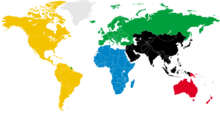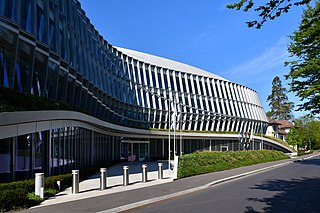
The International Olympic Committee is the international, non-governmental, sports governing body of the modern Olympic Games. Founded in 1894 by Pierre de Coubertin and Demetrios Vikelas, it is based in Lausanne, Switzerland. The IOC is the authority responsible for organizing the Summer, Winter, and Youth Olympics. The IOC also is the governing body of the National Olympic Committees (NOCs) and of the worldwide Olympic Movement, the IOC's term for all entities and individuals involved in the Olympic Games. As of 2020, 206 NOCs officially were recognized by the IOC. The IOC president has been Thomas Bach since 2013.

Squash, sometimes called squash rackets, is a racket sport played by two (singles) or four players (doubles) in a four-walled court with a small, hollow, rubber ball. The players alternate in striking the ball with their rackets onto the playable surfaces of the four walls of the court. The objective of the game is to hit the ball in such a way that the opponent is not able to play a valid return. There are about 20 million people who play squash regularly world-wide in over 185 countries. The governing body of squash, the World Squash Federation (WSF), is recognized by the International Olympic Committee (IOC), and the sport will be included in the Olympic Games, starting with the 2028 Summer Olympics in Los Angeles. The Professional Squash Association (PSA) organizes the pro tour.
World Athletics, formerly known as the International Amateur Athletic Federation and International Association of Athletics Federations and formerly abbreviated as the IAAF, is the international governing body for the sport of athletics, covering track and field, cross country running, road running, race walking, mountain running, and ultra running. Included in its charge is the standardization of rules and regulations for the sports, certification of athletic facilities, recognition and management of world records, and the organisation and sanctioning of athletics competitions, including the World Athletics Championships. The organisation's president is Sebastian Coe of the United Kingdom, who was elected to the four-year position in 2015 and re-elected in 2019 for a second four-year term, and then again in 2023 for a third four-year term.

The Court of Arbitration for Sport is an international body established in 1984 to settle disputes related to sport through arbitration. Its headquarters are in Lausanne, Switzerland and its courts are located in New York City, Sydney, and Lausanne. Temporary courts are established in current Olympic host cities.

The International Volleyball Federation commonly known by the acronym FIVB. Is the international governing body for all forms of volleyball. Its headquarters are located in Lausanne, Switzerland, and its current president is Ary Graça of Brazil.

The International Skating Union (ISU) is the international governing body for competitive ice skating disciplines, including figure skating, synchronized skating, speed skating, and short track speed skating. It was founded in Scheveningen, Netherlands, in July 1892, making it one of the oldest international sport federations. The ISU was formed to establish standardized international rules and regulations for the skating disciplines it governs, and to organize international competitions in these disciplines. It is now based in Switzerland.

David Troy Palmer is an Australian retired professional squash player. He won the Super Series finals in 2002, the World Open in 2002 and 2006; the British Open in 2001, 2003, 2004 and 2008; and the Australian Open in 2008. He attained World No. 1 ranking in September 2001 and again in February 2006.
Chris Walker is a male squash coach and former professional squash player from England.

United World Wrestling (UWW) is the international governing body for the sport of Wrestling; its duties include overseeing wrestling at the World Championships and Olympics. It presides over international competitions for various forms of wrestling, including Greco-Roman, Freestyle, Grappling, and others. The flagship event of UWW is the World Wrestling Championships.
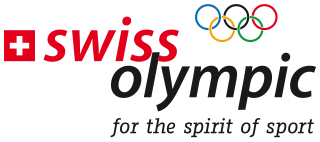
The Swiss Olympic Association is the National Olympic Committee and the umbrella organisation for organised Swiss sport under private law. It has 104 members, to which some two million people belong, practising sports in about 19,000 clubs. Swiss Olympic has its headquarters in the House of Sports in Ittigen near Bern. Swiss Olympic represents Olympic as well as non-Olympic sports and is a non-profit organisation. The big sports federations are divided into regional and cantonal associations. Former National Council member Jürg Stahl has been President since 2017. Roger Schnegg has been Director since January 2012.
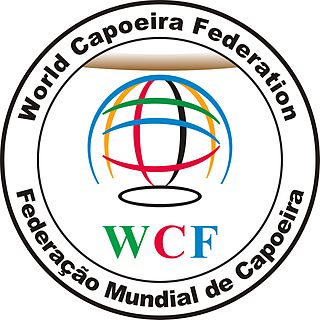
The World Capoeira Federation (WCF) is an international non-profit organisation whose main mission is to implement the systems and standards of sport capoeira with the view of getting capoeira into the Olympic Games.
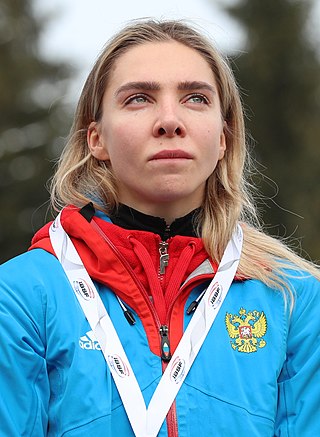
Elena Valeryevna Nikitina is a Russian skeleton racer who joined the national squad in 2009. She rides a Schneider sled, and her coach is Denis Alimov. Before starting skeleton, she was an association football player.

The Philippine Squash Academy (PSA) is the governing body of squash in the Philippines.
Squash is a recreational sport in India but is slowly gaining popularity as a competitive sport. It is governed by the Squash Rackets Federation of India. The India men's national squash team has participated in three quarter finals of the World Team Squash Championships since 1967.

Russia was originally scheduled to compete during the 2016 Summer Paralympics in Rio de Janeiro, Brazil, in what would have been its sixth consecutive appearance at the Summer Paralympics as an independent nation. Russia had qualified athletes in ten sports.
The Dominican Taekwondo Federation is the governing body for the sport of taekwondo in the Dominican Republic.
Moira Lassen, mother of Jeane Lassen, and Leif Erik Lassen, is the first woman ever elected to the International Weightlifting Federation (IWF) Executive Board. Lassen, former Chair of the Canadian Association for the Advancement of Women and Sport and Physical Activity (CAAWS) also chairs the IWF Women's Commission.
Systematic doping of Russian athletes has resulted in 51 Olympic medals stripped from Russia, four times the number of the next highest, and more than 30% of the global total. Russia has the most competitors who have been caught doping at the Olympic Games in the world, with more than 150.
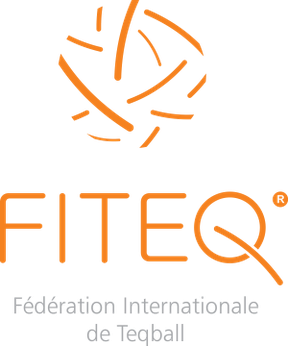
The International Teqball Federation is the governing body for the sport of teqball and para teqball. FITEQ is responsible for the organisation of teqball's major international tournaments, notably the Teqball World Championships.

The International Testing Agency, often referred to by the acronym ITA, is an independent organisation constituted as a non-profit foundation which implements anti-doping programs for international sports federations, major event organizers or any other anti-doping organisation requiring support. The organisation was created in 2018 under the supervision of the World Anti-Doping Agency (WADA) and the International Olympic Committee (IOC) to promote independence, expertise and transparency in the global fight against doping. Its headquarters are located in the city of Lausanne in Switzerland.
















